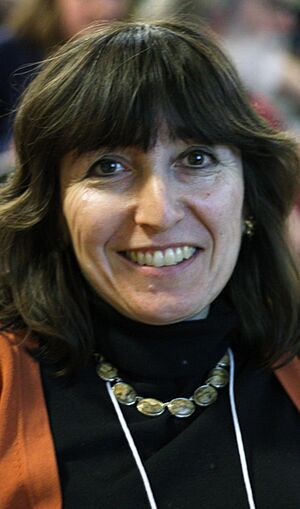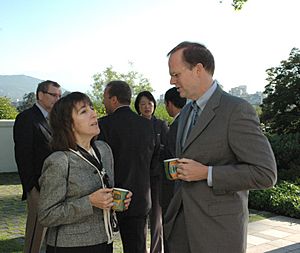Wendy Freedman facts for kids
Quick facts for kids
Wendy Freedman
|
|
|---|---|

Freedman in 2010
|
|
| Born | July 17, 1957 Toronto, Canada
|
| Alma mater | University of Toronto (B.Sc. & Ph.D.) |
| Awards | Magellanic Premium (2002) Gruber Cosmology Prize (2009) Dannie Heineman Prize for Astrophysics (2016) Nature's 10 (2024) |
| Scientific career | |
| Institutions | Carnegie Observatories University of Chicago |
| Thesis | The Young Stellar Content of Nearby Resolved Galaxies (1984) |
Wendy Laurel Freedman is a famous Canadian-American astronomer. She is best known for figuring out the Hubble constant. This number helps us understand how fast the universe is growing. She also used to be the director of the Carnegie Observatories. These are important places for studying space in California and Chile. Today, she is a professor at the University of Chicago. Her main work is studying how the universe expands. She also tries to find out if there are missing pieces in our understanding of the universe.
In 2025, Time magazine said she was one of the 100 most important people in the world.
Contents
Early Life and Education
Wendy Freedman grew up in Toronto, Canada. Her dad was a doctor, and her mom was a concert pianist. She became interested in science because of a physics class in high school. This led her to the University of Toronto. There, she first studied biophysics. Later, she changed to astronomy. She earned her first degree in 1979. She then continued her studies at the same university. She got her Ph.D. in astronomy and astrophysics in 1984.
After finishing her studies, she joined the Carnegie Observatories in California. She started there in 1984. Three years later, she became a permanent scientist. She was the first woman to join the permanent staff at Carnegie. In 2003, she became the Director of Carnegie Observatories. Early in her career, Wendy Freedman studied how far away galaxies are. She also looked at the stars inside nearby galaxies.
Measuring the Universe's Expansion
Wendy Freedman was a leader of a big international team. This team had 30 astronomers. They worked on the Hubble Space Telescope Key Project. Their goal was to measure the Hubble constant. This number tells us how fast the universe is expanding right now. It also helps us figure out the size and age of the universe.
The team used special stars called Cepheid variable stars. They measured the distances to 24 galaxies using these stars. They also used five other ways to measure the Hubble constant. In 2001, the team, led by Freedman, shared their final result. Their work made the Hubble constant measurement much more accurate. It helped solve a big debate among scientists.
She is still working to make these measurements even better. She uses Cepheid variable stars and another method. This other method is called the "tip of the red-giant branch."
Giant Magellan Telescope Project
Wendy Freedman started the Giant Magellan Telescope (GMT) Project. She was the head of its board from 2003 to 2015. The GMT is a huge project. Many universities and science groups from different countries are working together. They are building a very large telescope. It will be in the Andes mountains in Chile.
The main mirror of the GMT is 80 feet (25 meters) wide. When it is finished, it will be the second-largest telescope on Earth. The telescope is currently being built. It is expected to be fully working by 2034. It will be able to take pictures that are 10 times clearer than those from the Hubble Space Telescope.
Awards and Recognition
Wendy Freedman has received many honors. She is a member of important science groups. These include the US National Academy of Sciences. She is also a Fellow of the American Physical Society. In 2023, she became a Fellow of the Royal Society.
She has won several awards for her work in studying the universe. These include the Magellanic Premium Award in 2002. In 2009, she shared the Gruber Cosmology Prize. She also received the 2016 Dannie Heineman Prize for Astrophysics. This award was for her great work in measuring cosmic distances. Her work helped scientists understand the universe better.
In 2020, she was named a Legacy Fellow of the American Astronomical Society. In 2024, she was included in Nature magazine's list of 10 important scientists. In 2025, Wendy Freedman received the National Medal of Science.
An asteroid was named after her! It is called 107638 Wendyfreedman. An astronomer named David Healy found it in 2001.
Personal Life
Wendy Freedman is married to Barry F. Madore. He is also a scientist she has worked with for a long time. They have two children.
See also
 In Spanish: Wendy Freedman para niños
In Spanish: Wendy Freedman para niños
- List of women in leadership positions on astronomical instrumentation projects
 | Georgia Louise Harris Brown |
 | Julian Abele |
 | Norma Merrick Sklarek |
 | William Sidney Pittman |


